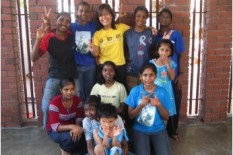It was a Sunday afternoon and we sat on a modest living room couch among a huddle of children and teenagers, all armed with warm smiles. We had just arrived from a 45-minute drive from Kuala Lumpur and were at one of our quarterly visits to Rumah Perlindungan Sosial (RPS), a shelter for women and girls in crisis situations established by YWCA Klang in collaboration with the National Council of Women's Organizations (NCWO) in February 1996.
The girls were eager to address the question we asked in our casual conversation: What brought you here, and what has changed since?
"I couldn't concentrate on my studies."
"My parents were always shouting and fighting!"
"My father would beat my mother. He can't do that, right? Anyway, he has another family now and doesn't want to see us anymore."
"Now, I can actually go for tuition, and I can catch up on my studies."
"Here, we are like a big family."
Located in a housing estate in the city of Klang, Malaysia, RPS is run by a small group of dedicated women who are ever-willing to care for the needs of its clients. They come from various parts of Malaysia, many referred by other NGOs, the police, hospitals and other service or governmental agencies.
RPS provides holistic help for women and girls in crisis. This includes survivors of domestic violence, single mothers, unwed mothers, rape survivors, abandoned children and runaway teens on a sustained and temporary basis.
Devi, who suffered at the hands of her alcoholic husband, was referred to RPS in 2008 by a church in Klang. She and her three daughters received shelter and counsel at RPS while her son was placed in another home. Despite being 'found' by her husband who would holler for the children at the front gate, her two elder daughters, Loges and Deepa, completed high school and attended a one-year residential course in Computer, Secretarial & Basic Accounting at the YWCA Vocational Training Opportunity Centre (VTOC) in Kuala Lumpur. In 2009, Devi was appointed as one of RPS' housemothers. In 2010, after Loges and Deepa found employment, the family moved into rented premises. Devi's youngest daughter is attending an IT course while her son is currently unemployed. In line with RPS' thrust towards reconciliation and conflict resolution and with the encouragement of RPS volunteers, the children now acknowledge their father and are in contact with him.

RPS provides shelter for an average of 40 domestic violence survivors per year. Most of them only stay for a short period but those who are unable to live independently are allowed to stay longer. Thanks to companies like Johnson & Johnson, school-going children at RPS attend private remedial classes, receive pocket money for school and are encouraged with small monetary rewards for improvements in their academic results! Employees of Johnson & Johnson Malaysia even raised funds for RPS on their own accord and set up a library for the children.
Because many adult RPS clients have little education, efforts are also made to equip them with basic literacy and income generating skills. One client, Parames, who was divorced due to domestic violence, was also given the opportunity to further develop her skills at YWCA VTOC's one-year Culinary & Bakery course. With seed money from Johnson & Johnson, Parames opened a food stall in a low-cost housing area. Her stall was burgled shortly after its soft launch but Parames remained undeterred and commenced on a home catering business instead, utilizing connections made during the short life of her food stall!
Domestic violence, as in most parts of the world, remains a grave social concern in Malaysia, affecting and disrupting the lives of entire families. The Domestic Violence Act (DVA) was passed in 1994 after almost a decade of advocacy efforts and was implemented on 1 June 1996. But still, according to the Royal Malaysia Police and Ministry of Women, Family and Community Development, 3173 cases were reported in 2010. For us, those reported cases have the face of the bright, warm women that we visited at RPS on a Sunday afternoon. For these women, there is hope beyond the domestic violence that they have suffered....hope for a happy future.